My friend Cooper carries neither gun nor rod. He is perfectly content to guide me. There is no better upland bird hunting guide in New England. That’s not just my opinion. Everyone who has hunted with Cooper says so.
In the grouse and woodcock woods I often disappoint him, and he lets me know it — but only with dirty looks.
He’s never surly, so I can’t say he’s the worst fishing guide I’ve known. But he’s close. Despite his deficiencies on trout streams, I enjoy his company. So when he asked to come along when I hiked to Hyla Brook, I said okay. He loves the Yankee woods as much as I do.
There are few brooks in Massachusetts one hikes to. Most are accessible from cement bridges lined with metal guardrails or dirt lanes lined with Styrofoam worm containers.
But no road comes near Hyla Brook, and it drains 20 square miles of unmolested forest. Icy feeder rills hurry down from hemlock-shaded ridges. And there are four meadows short enough to keep water cold, long enough for back casts, and deep enough for brook trout to thrive — little fish of big country. Best of all, Hyla Brook isn’t on the state stocking list.
More Like This
Cooper and I can afford to fall in love with Hyla Brook, secure in the knowledge that it will never be defiled — not because anyone else has ever loved it, only because Boston drinks it.
I’m winded before we reach the first meadow. Cooper isn’t. He plunges through puckerbrush and leaps across backwaters. I say nothing.
The woods are cool and bright and wet. It is the time of marsh marigolds. The banks are ablaze with them. There are beds of sphagnum moss still holding frost. False hellebore is leafing out, and the woods are fragrant with sweet gale.
On higher ground, trout lilies are in pale yellow bloom. A flicker laughs. A grouse drums.
We slip into the brook, moving up through fields of watercress and feeling gravel crunch under our feet. It’s hard to tell where the air stops and the water begins. We step shallow and come up deep.
At the first gleam of flat water, I ask my enthusiastic fishing guide to please walk beside me on the bank. Cooper grumbles but complies.
I step over beaver cuttings and pass under alders, brushing spiderwebs from my face. Finally, I’m standing belly deep, rod aloft.
My fly is a dark Cahill. I haven’t seen anything hatching. But brook trout in woodland streams are rarely selective. They evolved in sterile water, so they usually can’t afford to pass up anything that looks edible.
Something must be hatching because trout are rising. Now and then, one pops into the sunlight, hangs across the pool and splashes back. I hold the first one I catch in the cold flow — a male. His chestnut flanks are flecked with sapphire and ruby, scarlet fins trimmed with quartz, belly the color of a New England sunset.
Summer
Maine brook trout aren’t much different, just bigger. Perhaps because we transfer them directly from pond to pan to mouth, the wild squaretails of Secret Pond (I’ll call it, for that is not its name) always taste better than any other fish. Cooper agrees.
When it doesn’t rain, we lie outside our tent beside the spring that feeds trout fry to Secret Pond. Meteors slash across brilliant stars untarnished by ambient light. Loons yodel. Coyotes howl from the mountains along the Canadian border. Barred owls banter. And beavers etch the starry surface, cracking their tails in front of our beached canoe.
Here, 300 miles north of Boston, the only links to civilization are 35 miles of rain-gutted gravel road, and the Canadian Pacific tracks two miles north.
Cooper hears the train before I do. Then we both hear it for half an hour, even when it’s into Quebec, threading behind Megantic Mountain. I’m carried, as in Hank Snow’s song, “three thousand miles through the valleys and the forests,” asleep and onboard when the last, low whistle drifts over Secret Pond.
There’s no need for us to rise early. Most mornings, the trout don’t feed until nine. You’ll take plenty on top at dusk, but now you’ll have more success a bit down with wet flies.
Cooper does way better on ponds than in streams. He knows canoes. He balances well; he’s patient; and he’s content to just watch me cast. He withholds rebukes, even when the fly line slips from my fingers and collapses.
In the spring hole in front of the beaver dam, the line tightens on my index finger. There’s a throbbing weight, and the rod dips to the surface and below. Cooper watches intently. He’s even more impressed than I am as the great fish slides into the net. I need both hands to lift it.
In the pond’s west bay a bull moose submerges for lily pads. I give moose a wide berth. Cooper believes that moose are harmless and refuses to give them any berth at all.
Another day on another pond, Cooper convinced me to paddle up to a cow moose and her calf. We’d seen their trail on the bottom of the inlet. Clouds of mud still hung in the prints. The two moose are grazing in the high grass. As we ease in, the cow’s ears go back. The calf’s eyes are wide and white. I dig for the channel. Cooper grumbles.
A week later, I learned that in the township east, a guy in a pickup truck accidentally cut off a cow moose from her calf. Somehow, he’d gotten out of the truck in time. She kept coming down on the roof with her front hooves, and when she finished, the cabin was level with the hood.
Another danger in the Maine woods is getting lost. It happened to me a few years before I knew Cooper. I slept under an ancient pine in the rain, flyrod pointed to where I thought the road was. In the morning, on a hillside full of blackberries, I startled two bear cubs who squealed and ran up a tree. I stood and laughed at them. It had almost been worth it for this. Then I moved quickly, postulating that the sight of the mother might be less comic.
One spring in this country, loggers found a dead deer hunter seated against a balsam fir. He had walked 25 miles in a straight line, exactly in the wrong direction. Mice had eaten away most of his face. On the ground was a compass that proclaimed the Atlantic to lie toward the setting sun.
Fall
The trout in Hyla Brook ripen with the hardwoods, males red as the cardinal flowers. Deer are into the acorns. And the Great Bear walks upon the earth.
Now, in forgotten apple orchards, there’s a lightness in the wind. It sets golden aspen leaves aquiver and sends milkweed seeds sailing. The air is scented with wood smoke and wild grapes.
This is Cooper’s moment. He’s in his element. I am astonished and humbled at his ability in the grouse and woodcock woods. His energy is boundless, yet he doesn’t rush through coverts the way he rushes through streams. He is smart, methodical, focused. He complains when I stop to rest.
Cooper swears to me that there’s a grouse in the apple tree near the fallen barn. We ease through the pines, yellow needles falling on our necks. Thirty feet from the apple tree we stop. I shuffle to the left and stop again. We move closer. Nothing. We move closer still. Nothing. Finally, I utter a grunt of distrust. Cooper says there is Goddamned well a grouse in the apple tree. We wait. Nothing. I tell Cooper he’s full of shit.
He declines to budge, but as I turn, a grouse blasts out of the apple tree. I wheel and fire two salutes to its passing. Cooper gives me a look of disgust.
It is fitting that I soon encounter the third danger in the New England woods — an abandoned well. Years earlier, some considerate but clueless wanderer, appalled at the moss-lined passage to the bowels of the earth, covered it with logs. Now they’re rotten and concealed under pine needles. Thus, on a larger scale, do Africans trap elephants.
Something had always bothered me about the Hall homestead. Now — as I lie on my stomach, sucking air, fingers dug into black soil, right leg dangling in the void — I know what it was. I had never seen a well. How many times had Cooper and I circled this trap, inches from being swallowed into the 19th Century? I drop an empty 12-gauge shell into the well and count to five before I hear it plop.
The time of grouse is also the time of woodcock. These are night-tripping gnomes with three-inch bills and stubby tails — migratory birds, wafting south under the Hunter Moon, then dropping like oak leaves into willows and alder runs.
Sometimes they hold so tight Cooper almost steps on them. Then they whistle up, dipping and twisting, bills tucked into their chests.
Most of my hunting friends, Cooper included, dislike woodcock because they taste like liver. But I love liver, so I love sautéed woodcock. Sometimes I get my friends’ birds.
Winter
One morning, after the north wind has wasted December’s last leaves, our woodcock coverts are empty, and the grouse are wise and wild.
Now is the time of the jiggermen. We do not “jig.” We jigger. We fish for yellow perch through the ice with jiggers and three-foot rods we make ourselves. Anything you buy is useless. There are fewer than 30 real jiggermen left in Massachusetts, and I know most of them. We’re a dying breed.
Cooper loves jiggering. His favorite part is keeping the gulls away from perch whose necks I’ve broken and tossed on the ice. But he refuses to follow me onto black “prayer ice” — i.e., ice I can punch through in four hits with the spud bar made by master jiggerman Bill Adamonis.
Cooper and I agree that only one fish tastes almost as good as brook trout — yellow perch in winter. And they’re so prolific you don’t feel bad about killing a bucketful.
Today the perch are eating. They’re eating, declares Adamonis, who has joined Cooper and me, because a storm is coming. He offers no explanation as to why the perch were also eating the previous week with no storm coming.
Here, in 12 feet of water, perch hover over the bottom. Lying on my belly, I watch them through my chopped hole as they ease up to my fluttering jigger, propelled only by their pectoral fins. A tiltman yells to ascertain if I am alive.
Ice splutters in the sun, and we hear the “feebee” song of a male chickadee. “Spring always comes so early,” laments Adamonis.
Spring Again
Suddenly, the hardwoods are green. I’m with Jack Swedberg, floating the St. John River in northern Maine — without Cooper.
The river, swollen with snowmelt and 11 days of rain, sweeps us 40 miles the first day. It’s a big river, sometimes 150 yards across, potable all the way to Fort Kent, the last truly wilderness river in the East.
We reach Big Black Rapids shortly before dusk, nearly getting sucked in, warned only by a throbbing felt more than heard. We clutch willows and goggle at the mile-long chute of geysers, rooster tails and six-foot standing waves.
This whitewater requires portage. But hauling our gear and canoe through thick spruce is exhausting work.
Halfway down, we decide to risk the rest. Night is almost upon us, and we are, after all, past the really scary stuff. We breathe deeply and shove off. When I look at the waves, the canoe is motionless. When I look at the bank I see only a blur of spruce.
Abruptly, we’re disgorged into a sudsy pool, wet but afloat — this to the astonishment and admiration of the whitewater veterans who have portaged around the whole chute. They help us ashore and share their campfire and steaks with us.
If they’d asked us if we’d portaged around the bad part, we probably would have told them.
In the morning, we fish for brook trout. Three times, bald eagles flush from snags. An osprey plunges and labors off with a fallfish. Tight formations of mergansers whistle along the banks. A grouse drums. False hellebore is leafing out, and the air is fragrant with sweet gale.
This is Cooper country. Sometimes I think I can hear him hurrying nervously along the high bank, stopping at the points to check our progress.
I couldn’t say goodbye to him at the vet’s. All I could do was sign the form and stumble out to the car.
I now know this was a mistake. Cooper needed me beside him. Since then, I’ve always stayed with my Brittanys, hugging them until they draw their last breaths.





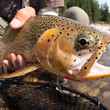
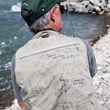
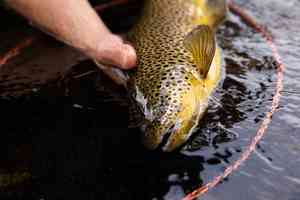

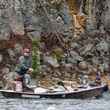
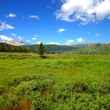
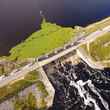
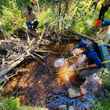
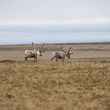
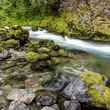
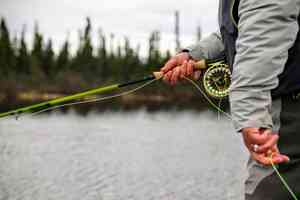

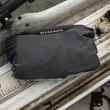

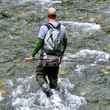



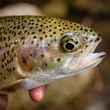
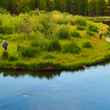
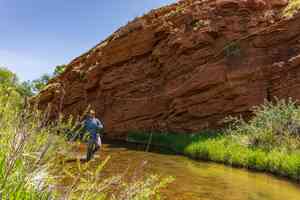

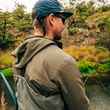
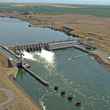
Comments